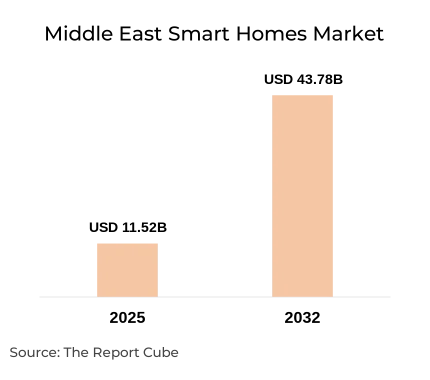
Understand The Key Trends Shaping This Market
Download Free SampleMiddle East Smart Homes Market Insights & Analysis
The Middle East Smart Homes Market is anticipated to register a CAGR of around 21% during the forecast period, 2025-32. The region is experiencing a growing trend towards smart homes, with the increasing adoption of technology-driven solutions to enhance comfort, convenience, and security within residential spaces.
Automation systems for homes are becoming more & more popular among homeowners as they provide easy control over a number of household functions, like security, heating, cooling, and lighting. Owing to the constantly increasing number of older individuals, the healthcare industry, and smart home health in particular is currently in the limelight. Voice-activated assistants, smart thermostats, and linked appliances are examples of smart technologies that are becoming more common & enable homeowners to remotely operate their homes via voice commands or smartphones. This, in turn, is helping to accelerate the growth of the market.
With enterprises like Honeywell providing integrated systems that let homeowners monitor & control their homes from anywhere, the Middle East Smart Home Market has grown significantly throughout the region, especially in the UAE and Kingdom of Saudi Arabia. In a similar vein, companies provide personalized smart home systems that include features, such as remote access to lighting & climate management and automated prayer times. Therefore, supported by these aspects, it is estimated that the trend toward smart houses would elevate over the next several years.
Middle East Smart Homes Market Dynamics
- Wi-Fi & Next-Gen Networks Fueling Smart Home Market Growth in the Middle East
The Middle East Smart Homes Market growth can be predominantly attributed to the proliferation & ease of use of Wi-Fi as the dominant method for connecting devices to the internet. This technological advancement has empowered many end users to explore & embrace smart home technology. According to industry experts, the introduction of 5G networks, especially in the Gulf Cooperation Council (GCC) region, along with the widespread adoption of 4G connectivity in other countries within the Middle East, has further accelerated the market's growth. These advanced networks provide faster & more reliable internet access, facilitating seamless connectivity between smart devices & enabling users to control & monitor their homes remotely conveniently.

- Smart Home Health Solutions for Aging Populations Opening Up New Avenues
There is a lot of potential in the Middle East Smart Home Market, specifically given the chance it offers to meet the needs of the elderly & those with physical disabilities. By enabling family members & caregivers to remotely monitor the elderly's health using technology, like sensors & associated algorithms, smart home health offers the next generation of medical services for the elderly.
By creating creative, approachable, and reasonably priced smart home health solutions that are appropriate to the unique requirements of the elderly & people with physical disabilities, manufacturers and developers can meet this demand. By leveraging the region's potential & addressing the unique challenges the aging population faces, smart home technologies are expected to enhance the quality of life for older individuals and promote their overall well-being in the Middle East.
- Cybersecurity Risks & Data Loss Concerns to Limit the Adoption
Due to cybersecurity threats & worries about data loss, the Middle East Smart Home Market has a crucial time becoming widely accepted. Potential users are hesitant to embrace these technologies owing to the vulnerabilities in networked smart home systems, which have been demonstrated by cyberattacks & data breaches.
The possibility of data breaches & the exploitation of personal information is a major concern for both individuals and enterprises, given the huge volume of data generated and gathered by smart home devices. For example, in 2023, the UAE Cyber Security Council, in association with its partners, is positively blocking over 50,000 cyberattacks daily, with a particular focus on sectors, such as banking, finance, health, and oil & gas.
In the context of smart homes, any loss or settlement of personal data not only results in privacy breaches but also poses a threat to the security & well-being of residents. Consequently, these concerns are impeding the growth potential of the Middle East Smart Home Market.
Middle East Smart Homes Market Segment-wise Analysis
By Product Type:
- Entertainment Controls
- Security & Access Control
- HVAC Control
- Smart Home Appliances
- Smart Kitchen
- Smart Lighting Control
- Smart Furniture
- Others
The Smart Home Appliances segment is anticipated to uphold the lion's share of the Middle East smart home market. This elevation of the segment is majorly due to consumers' increasing desire for home automation & convenience, which has encouraged the widespread acceptance of smart appliances. The individuals experience is improved by the inculcation of functions like remote monitoring, scheduling, and energy management in these smart appliances, which include refrigerators, washing machines, and dishwashers.
With the progress of wireless communication technology, smart appliance adoption has enhanced significantly. Owing to the wireless connections with smartphones and tablets, users can control and keep an eye on their appliances from anywhere, offering unparalleled convenience & flexibility. The rising need for convenience among consumers is contributing to the future growth of the industry in the Middle East.
By Technology:
- Cellular Network Technology
- Protocols & Standards
- Wireless Communication Technology
Cellular Network Technologies have emerged as the dominant force, holding the biggest share of the Middle East Smart Homes Market. The widespread adoption of cellular networks has been driven by the growing recognition of the Internet of Things (IoT) and its voice-command capabilities. With the help of sensor-based connectivity & IoT integration, these networks enable smooth connectivity between smartphones & smart home appliances.
Additionally, the number of internet users in the Middle East has significantly upscaled, and the demand for smart home appliances has surged due to the region's increased reliance on voice control technology. Further, projections show that this trend would continue through 2032. It has not only increased the usage of smart homes but has also played a significant role in propelling the market's expansion.
Regional Projection of the Middle East Smart Homes Industry
The Middle East Smart Homes Market is geographically diversified, covering:
- The UAE
- Saudi Arabia
- Qatar
- Kuwait
- Oman
- Bahrain
- Israel
- Egypt
- Turkey
Owing to several factors, like rising disposable income, increased urbanization, and a strong emphasis on technology breakthroughs, nations such as UAE, Saudi Arabia, and Qatar are setting the standard for the adoption of smart homes. Also, the aspiration for creative home solutions is being further fueled by the boom in construction activities in these countries, which includes the creation of residential complexes & smart cities.
Moreover, in the upcoming years, it is predicted that other Middle Eastern nations such as Bahrain, Kuwait, and Oman would also witness substantial growth as knowledge & familiarity with smart home technology rise.
What Does Our Middle East Smart Homes Market Research Study Entail?
- The Middle East Smart Homes Market Research Report highlights the forecast growth rate or CAGR by anticipating the market size & share.
- The market analysis puts light upon the primary industry trends, driving aspects, potential opportunities, growth challenges, and other major factors.
- The Middle East Smart Homes Market Research Report entails details about the most critical shifts in market share in the prominent regions.
- Considering the statistics & the developments by the primary market competitors, our report also strives to demonstrate the most sought-after strategies of the key players.
Table of Contents
- Introduction
- Objective of the study
- Product Definition
- Market Segmentation
- Study Variables
- Research Methodology
- Secondary Data Points
- Companies Interviewed
- Primary Data Points
- Break Down of Primary Interviews
- Secondary Data Points
- Executive Summary
- Market Dynamics
- Drivers
- Challenges
- Opportunity Assessment
- Recent Trends and Developments
- Policies and Regulatory Landscape
- Import Export Analysis
- Supply Chain Analysis
- Middle East Smart Homes Market Overview (2020-2032)
- Market Size, By Value (in USD Millions)
- Middle East Smart Homes Market Share, By Product Type
- Entertainment Control
- Security and Access Control
- HVAC Control Systems
- Smart Home Appliances
- Smart Kitchen
- Lighting Controls
- Furniture
- Others
- Middle East Smart Homes Market Share, By Technology
- Wireless Communication
- Protocols & Standards
- Cellular Network
- Middle East Smart Homes Market Share, By Distribution Channel
- Online
- Offline
- Middle East Smart Homes Market Share, By Country
- Saudi Arabia
- UAE
- Qatar
- Kuwait
- Oman
- Bahrain
- Israel
- Egypt
- Turkey
- Rest of Middle East
- Middle East Smart Homes Market Share, By Company
- Market Share, By Top 3 Companies
- Competitive Outlook (Company Profiles – Partial List)
- ABB Ltd.
- Company Overview
- Business Segments
- Strategic Alliance/Partnerships
- Recent Developments
- Johnson Controls
- Company Overview
- Business Segments
- Strategic Alliance/Partnerships
- Recent Developments
- United Technologies Corporation
- Company Overview
- Business Segments
- Strategic Alliance/Partnerships
- Recent Developments
- Emerson Electronics Co.
- Company Overview
- Business Segments
- Strategic Alliance/Partnerships
- Recent Developments
- Honeywell International, Inc.
- Company Overview
- Business Segments
- Strategic Alliance/Partnerships
- Recent Developments
- Legrand S.A.
- Company Overview
- Business Segments
- Strategic Alliance/Partnerships
- Recent Developments
- Lutron Electronics, Inc.
- Company Overview
- Business Segments
- Strategic Alliance/Partnerships
- Recent Developments
- Schneider Electric S.A.
- Company Overview
- Business Segments
- Strategic Alliance/Partnership
- Recent Developments
- Siemens AG
- Company Overview
- Business Segments
- Strategic Alliance/Partnerships
- Recent Developments
- Financials
- Robert Bosch GmbH
- Company Overview
- Business Segments
- Strategic Alliance/Partnerships
- Recent Developments
- Others (Samsung Electronics Co., Ltd., Haier Group, Crestron Electronics, Inc., LG Electronics, Inc.)
- ABB Ltd.
- Contact Us & Disclaimer
List of Figure
Introduction & Market Overview
Figure 1.1: Middle East Smart Homes Market Size, By Value (USD Millions) (2020–2032)
Figure 1.2: Middle East Smart Homes Market Share, By Product Type
Figure 1.3: Entertainment Control Market Share
Figure 1.4: Security and Access Control Market Share
Figure 1.5: HVAC Control Systems Market Share
Figure 1.6: Smart Home Appliances Market Share
Figure 1.7: Smart Kitchen Market Share
Figure 1.8: Lighting Controls Market Share
Figure 1.9: Furniture Market Share
Figure 1.10: Others Market Share
Technology Segmentation
Figure 2.1: Middle East Smart Homes Market Share, By Technology
Figure 2.2: Wireless Communication Market Share
Figure 2.3: Protocols & Standards Market Share
Figure 2.4: Cellular Network Market Share
Distribution Channel & Geography
Figure 3.1: Middle East Smart Homes Market Share, By Distribution Channel (Online vs Offline)
Figure 3.2: Middle East Smart Homes Market Share, By Country
Figure 3.3: Market Share in Saudi Arabia
Figure 3.4: Market Share in UAE
Figure 3.5: Market Share in Qatar
Figure 3.6: Market Share in Kuwait
Figure 3.7: Market Share in Oman
Figure 3.8: Market Share in Bahrain
Figure 3.9: Market Share in Israel
Figure 3.10: Market Share in Egypt
Figure 3.11: Market Share in Turkey
Figure 3.12: Market Share in Rest of Middle East
Competitive Landscape
Figure 4.1: Market Share of Top 3 Companies
Figure 4.2: ABB Ltd. – Strategic Alliances & Partnerships
Figure 4.3: Johnson Controls – Strategic Alliances & Partnerships
Figure 4.4: United Technologies Corporation – Strategic Alliances & Partnerships
Figure 4.5: Emerson Electronics Co. – Strategic Alliances & Partnerships
Figure 4.6: Honeywell International, Inc. – Strategic Alliances & Partnerships
Figure 4.7: Legrand S.A. – Strategic Alliances & Partnerships
Figure 4.8: Lutron Electronics, Inc. – Strategic Alliances & Partnerships
Figure 4.9: Schneider Electric S.A. – Strategic Alliances & Partnerships
Figure 4.10: Siemens AG – Strategic Alliances & Partnerships
Figure 4.11: Robert Bosch GmbH – Strategic Alliances & Partnerships
Others & Financials
Figure 5.1: Financial Performance Overview of Key Companies
Figure 5.2: Market Share of Other Players (Samsung, Haier, Crestron, LG, etc.)
List of Table
Introduction & Research Methodology
Table 1.1: Objective of the Study
Table 1.2: Product Definition
Table 1.3: Market Segmentation
Table 1.4: Study Variables
Table 1.5: Research Methodology Overview
Table 1.6: Secondary Data Points
Table 1.7: Companies Interviewed
Table 1.8: Primary Data Points
Table 1.9: Breakdown of Primary Interviews
Executive Summary & Market Dynamics
Table 2.1: Key Market Drivers
Table 2.2: Major Challenges
Table 2.3: Opportunity Assessment
Table 2.4: Recent Trends and Developments
Table 2.5: Policies and Regulatory Landscape
Trade & Supply Chain Analysis
Table 3.1: Import Export Analysis of Middle East Smart Homes Market
Table 3.2: Supply Chain Analysis
Market Size & Segmentation
Table 4.1: Middle East Smart Homes Market Size by Value (2020–2032)
Table 4.2: Market Size by Product Type
Table 4.3: Market Size by Technology
Table 4.4: Market Size by Distribution Channel
Table 4.5: Market Size by Country
Competitive Landscape
Table 5.1: Market Share by Top Companies
Table 5.2: Company Profiles Overview
Table 5.3: ABB Ltd. – Business Segments and Recent Developments
Table 5.4: Johnson Controls – Business Segments and Recent Developments
Table 5.5: United Technologies Corporation – Business Segments and Recent Developments
Table 5.6: Emerson Electronics Co. – Business Segments and Recent Developments
Table 5.7: Honeywell International, Inc. – Business Segments and Recent Developments
Table 5.8: Legrand S.A. – Business Segments and Recent Developments
Table 5.9: Lutron Electronics, Inc. – Business Segments and Recent Developments
Table 5.10: Schneider Electric S.A. – Business Segments and Recent Developments
Table 5.11: Siemens AG – Business Segments and Recent Developments
Table 5.12: Robert Bosch GmbH – Business Segments and Recent Developments
Table 5.13: Others (Samsung, Haier, Crestron, LG) – Key Details
Top Key Players & Market Share Outlook
- ABB Ltd.
- Johnson Controls
- United Technologies Corporation
- Emerson Electronics Co.
- Honeywell International, Inc.
- Legrand S.A.
- Lutron Electronics, Inc.
- Schneider Electric S.A.
- Siemens AG
- Robert Bosch GmbH
- Samsung Electronics Co., Ltd.
- Haier Group
- Crestron Electronics, Inc.
- LG Electronics, Inc.
Frequently Asked Questions








